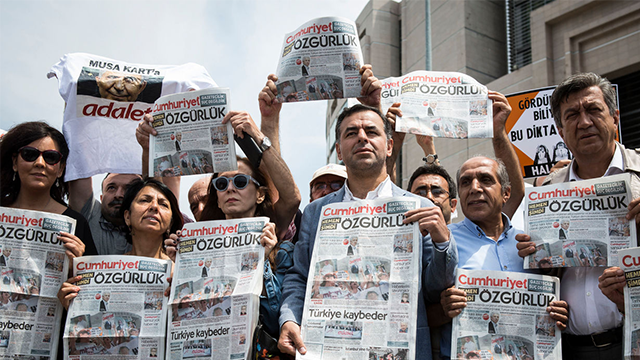As the debate over Immigrants continued, some very interesting insights were picked up by our Team over Twitter over the past 48 hours. This is as our team also was assessing the latest out of the Middle East as President Trump's Envoys were touring Arab Capitals to entice Arab Governments to be on board on the proposed Peace Plan--and as we will keep an eye on Mexico as it gets ready to go to the Polls--and across the World, Turkey just gave Erdogran a new mandate.
This is as the team from the Economist released its' daily dispatch in the aftermath of the Supreme Court Decision Yesterday--as the President continued attacks on Democrats and BMW (even though BMW has its' largest plant in South Carolina):
| |
| After months of legal wrangling over Donald Trump’s trio of executive orders banning travel from a number of Muslim-majority countries, the Supreme Court today voted 5-4 in favour of upholding the ban. Chief Justice Roberts wrote that it was promulgated “to protect national security and public safety”, and fits within the president’s powers. Though lower courts can take up the case again,the decision in effect ends the battle |
|
| |
| |
| |
| |
| China-US relationsTrading peace for war |
| |
| As the risk of a serious Sino-American trade war grows, attention is mostly focused on the prospect of dearer iPhones and unhappy soyabean farmers. Yet the stakes are much higher. However warily American and Chinese leaders eye each other, economic self-interest keeps their most hawkish impulses in check. An end to the mutual entanglement of their economies would remove those constraints, writes our Free Exchange columnist |
|
| |
| |
| |
| |
Tropical diseasesWinning the fight |
| |
| Sierra Leone is doing a better job of tackling neglected tropical diseases—which affect 1.5 billion people worldwide—than almost any other country in Africa, despite having only 400 doctors for its 7m people. Half the population used to have river blindness in 2003, but now it affects only 2% of people. The country has pulled off this feat through a national control plan, by tackling several diseases at once and by fighting the stigma around them |
|
| |
| |
| |
| |
| Public transportNo use |
| |
| In much of the the rich world, urban public transport is becoming emptier, even as populations continue to grow. City transport chiefs blame under-investment, roadworks, terrorists and high ticket costs. But the real change is in the way people travel. Developments such as video-conferencing and online shopping reduce the need for public transport, and the ubiquity of Uber and the like gives urbanitesmore options for getting around |
|
| |
| |
| |
| |
Open FutureMusa Kart and Turkey’s illiberal slide |
| |
| Recep Tayyip Erdogan, Turkey’s president, has been embroiled in a 15-year dispute with Musa Kart, a cartoonist. It all began with a benign depiction of Mr Erdogan as a cat entangled in a ball of wool. Since then Mr Kart has faced constant persecution. In 2016 he was sentenced to nearly four years in jail for drawing cartoons. His ordeal has become emblematic of the unravelling of democratic norms in Turkey |
|
| |





